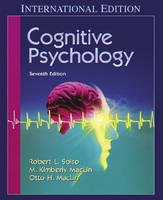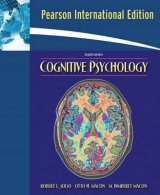
Cognitive Psychology
Pearson (Verlag)
978-0-205-42909-7 (ISBN)
- Titel erscheint in neuer Auflage
- Artikel merken
One of the top sellers in the field, Cognitive Psychology is a well-written, humorous, and up-to-date discussion of the rapidly changing area of cognitive psychology. This best-selling textbook remains the most comprehensive and balanced text in the area of cognition. The seventh edition retains the strengths that made it one of the most popular texts among students and professors and now includes the latest studies and current findings in cognitive neuroscience. It also explores the critical issues in cognitive psychology through both a historical and contemporary context. Students will develop a better understanding of how cognitive psychology is practiced today through the historical settings and the “Try This” and “Cognition in Everyday Life” boxes which encourage readers to become engaged and involved in the text material.
Preface.
1. Introduction to Cognitive Psychology.
What Is Cognitive Psychology?
Information-Processing Model.
The Domain of Cognitive Psychology.
A Brief History of Cognitive Psychology.
Conceptual Science and Cognitive Psychology.
Summary.
Key Words.
Recommended Readings.
2. Cognitive Neuroscience.
Exploring the Brain.
Logbook: The Twenty-First CenturyBrain Sciences.
MindBody Issues.
Cognitive Neuroscience.
The Nervous System.
Neurophysiological Sensing Techniques.
A Tale of Two Hemispheres.
Summary.
Key Words.
Recommended Readings.
3. Perception and Attention.
The Computational Brain.
Sensation and Perception.
Perceptual Span.
Iconic Storage.
Echoic Storage.
Function of Sensory Stores.
Attention.
Processing Capacity and Selective Attention.
Auditory Signals.
Models of Selective Attention.
Visual Attention.
Automatic Processing.
The Cognitive Neuroscience of Attention.
Spotlight on Cognitive Neuroscience: Visual Attention.
Summary.
Key Words.
Recommended Readings.
4. Pattern Recognition.
Perceptual Theories.
Visual Pattern Recognition.
Gestalt Theory.
Canonic Perspectives.
Bottom-Up versus Top-Down Processing.
Template Matching.
Feature Analysis.
Prototype Matching.
Form Perception: An Integrated Approach.
Pattern Recognition among Experts.
Pattern Recognition—The Role of the Perceiver.
Spotlight on Cognitive Neuroscience: Pattern Recognition.
Summary.
Key Words.
Recommended Readings.
5. States of Consciousness.
History of Consciousness.
Consciousness as a Scientific Construct.
Cognitive Psychology and Consciousness.
Metaphors of Consciousness.
Modern Theories of Consciousness.
Functions of Consciousness.
Spotlight on Cognitive Neuroscience: Consciousness in the Brain.
Summary.
Key Words.
Recommended Readings.
6. Memory Processes.
Short-Term Memory.
Long-Term Memory.
Spotlight on Cognitive Neuroscience: Autobiographical Memory.
Summary.
Key Words.
Recommended Readings.
7. Memory Models.
Early Studies.
The Cognitive Neuroscience of Memory.
Two Memory Stores.
Memory in the Larger Cognitive Domain.
Models of Memory.
Spotlight on Cognitive Neuroscience: Working Memory.
Summary.
Key Words.
Recommended Readings.
8. Mnemonics and Experts.
A King from Texas Matches a Paul Bunyan King from Minnesota.
Mnemonic Systems.
Extraordinary Memories.
Experts and Expertise.
Spotlight on Cognitive Neuroscience: Chess Experts.
Summary.
Key Words.
Recommended Readings.
9. The Representation of Knowledge.
Semantic Organization.
Declarative Knowledge and Procedural Knowledge.
Associationist Approach.
Semantic Memory: Cognitive Models.
Representation of Knowledge—Neurocognitive Considerations.
Memory: Consolidation.
Connectionism and the Representation of Knowledge.
Spotlight on Cognitive Neuroscience: Representation of Knowledge.
Summary.
Key Words.
Recommended Readings.
10. Mental Imagery.
Historical Overview.
Imagery and Cognitive Psychology.
Cognitive Neuroscience Evidence.
Cognitive Maps.
Synesthesia: The Sound of Colors.
Spotlight on Cognitive Neuroscience: Cognitive Maps.
Summary.
Key Words.
Recommended Readings.
11. Language: Structure and Abstractions.
Linguistics.
Chomsky's Theory of Grammar.
Psycholinguistic Aspects of Language.
Cognitive Psychology and Language: Abstraction of Linguistic Ideas.
Knowledge and Comprehension.
A Model of Comprehension: Kintsch.
Language and Neurology.
Spotlight on Cognitive Neuroscience: Linguistics.
Summary.
Key Words.
Recommended Readings.
12. Language: Words and Reading.
Perceptual Span.
Lexical-Decision Task (LDT).
Word Recognition: A Cognitive-Anatomical Approach.
Comprehension.
Spotlight on Cognitive Neuroscience: Dyslexia.
Summary.
Key Words.
Recommended Readings.
13. Cognitive Development.
Life-Span Development.
Developmental Psychology.
Neurocognitive Development.
Cognitive Development.
Spotlight on Cognitive Neuroscience: Cognitive Development.
Summary.
Key Words.
Recommended Readings.
14. Thinking: Concept Formation, Logic, and Decision Making.
Thinking.
Concept Formation.
Logic.
Decision Making.
Decision Making and Rationality.
Spotlight on Cognitive Neuroscience: Decision Making.
Summary.
Key Words.
Recommended Readings.
15. Thinking: Problem Solving, Creativity, and Human Intelligence.
Problem Solving.
Creativity.
Human Intelligence.
Spotlight on Cognitive Neuroscience: Creative Problem Solving.
Summary.
Key Words.
Recommended Readings.
16. Computerized Cognition: Artificial Intelligence.
AI—The Beginnings.
AI and Human Cognition.
Machines and Minds: The Imitation Game and the Chinese Room.
Perception and AI.
Language and AI.
Problem Solving, Game Playing, and AI.
AI and the Arts.
Robots.
The Future of AI.
AI and Scientific Inquiry.
Spotlight on Cognitive Neuroscience: Artificial Face Recognition.
Summary.
Key Words.
Recommended Readings.
Glossary.
References.
Name Index.
Subject Index.
| Erscheint lt. Verlag | 2.9.2004 |
|---|---|
| Sprache | englisch |
| Maße | 188 x 230 mm |
| Gewicht | 960 g |
| Themenwelt | Geisteswissenschaften ► Psychologie ► Allgemeine Psychologie |
| Geisteswissenschaften ► Psychologie ► Verhaltenstherapie | |
| ISBN-10 | 0-205-42909-2 / 0205429092 |
| ISBN-13 | 978-0-205-42909-7 / 9780205429097 |
| Zustand | Neuware |
| Haben Sie eine Frage zum Produkt? |
aus dem Bereich



